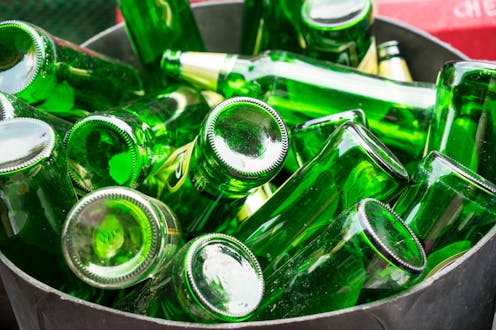Young people are drinking less in real life. But film and TV paints a different picture
- Written by Maree Patsouras, La Trobe University

The new Mean Girls is a fresh take on a classic teen comedy, this time appealing to a new audience: Gen Z. So how does the film paint the new generation? As one that loves to drink.
Mean Girls is filled with references to and depictions of alcohol. There’s drinking at parties, a scene where Cady gets drunk, and even a joke about a vodka-filled inhaler[1].
On-screen alcohol exposure is an important issue, particularly when underage drinking is shown. Greater on-screen exposure to alcohol is associated with an increased risk of beginning to drink alcohol at a younger age[2], and increased likelihood of weekly drinking and binge drinking among young people[3].
But despite the attempts to appeal to a young audience, the new Mean Girls film doesn’t reflect most of Gen Z’s attitudes towards drinking. In fact, research shows young people are increasingly rejecting alcohol[4], especially when compared to older generations. So why does alcohol retain a chokehold on our screens?
Drinks all round?
A 2023 Cancer Council report[5] found in 1996, 90% of Australian secondary school students aged 16–17 reported drinking alcohol in the past year. By 2023, this had dropped to 64%.
The report also found recent risky drinking – that is, consuming five or more alcoholic drinks on any day within the past week – among 16- and 17-year-olds has particularly declined, dropping from 22% in 1996 to 9% in 2023.
This trend isn’t unique to Australia[6]. Gen Z-ers across the world are drinking much less alcohol than previous generations.
Read more: Youth drinking is declining – myths about the trend, busted[7]
But we’re yet to see this decline reflected in films and television targeting young people.
A 2019 analysis[9] found alcohol remains the most frequently portrayed substance in films, and substance use (including alcohol) on screen was more often portrayed as having either neutral or rewarding consequences (such as increased popularity), in comparison to unrewarding consequences (such as vomiting or headaches).
One-fifth of teenage characters in PG-13 (roughly equivalent to an Australia M rating) and R-rated films are shown drinking alcohol[10], and nearly half of G-rated[11] animated films show alcohol use.
One prime example is Ratatouille (2007). This Disney-Pixar film is so beloved by Gen Z it got turned into a TikTok musical[12]. The film shows alcohol a whopping 60 times[13], even though it’s rated PG and aimed at children.
Alcohol imagery isn’t limited to film or broadcast TV. Recent research found more alcohol in streaming content from Amazon and Netflix[14] than in broadcast television.
And despite the sheer volume of on-screen alcohol depictions, our research shows films depict alcohol exposure nearly five times more frequently[15] than the average Australian adult thinks they do.
Lack of regulation – and young filmmakers
Locally, alcohol exposure in films is governed by the Australian Classification Board. The board considers six classifiable elements[16], such as sex and violence, when deciding on a rating.
Currently, alcohol is not explicitly represented among these, although excessive consumption and alcohol dependency is considered under the element of “themes”.
This has an impact: alcohol brand placements have nearly doubled in the last two decades, and alcohol brands appear in 41% of children’s films[17].
When we consider why young people are so often shown drinking in films, it’s not just a matter of what can be shown under Australian regulations. Film and television is largely not yet directed, written or created by Gen Z-ers. A lack of representation can lead to young people’s perspectives not being understood, or unaccounted for.
The mismatch between Gen Z’s drinking habits and the overexposure of alcohol in films is also surprising when we consider most adults in our research[18] were supportive of a range of policies restricting alcohol exposure in films. A significant number of adult Australians support policies de-glorifying alcohol consumption and beverages in films[19] – especially in films aimed at children.
Australia intends to reform its National Classification Scheme[20]. Perhaps these changes – along with Gen Z entering the film industry themselves – will allow for young people’s actual drinking habits to be reflected more accurately on screen.
Read more: Australians are embracing 'mindful drinking' — and the alcohol industry is also getting sober curious[21]
References
- ^ vodka-filled inhaler (www.commonsensemedia.org)
- ^ at a younger age (www.tandfonline.com)
- ^ among young people (publications.aap.org)
- ^ young people are increasingly rejecting alcohol (onlinelibrary.wiley.com)
- ^ Cancer Council report (www.health.gov.au)
- ^ unique to Australia (academic.oup.com)
- ^ Youth drinking is declining – myths about the trend, busted (theconversation.com)
- ^ Rawpixel.com/Shutterstock (www.shutterstock.com)
- ^ 2019 analysis (www.tandfonline.com)
- ^ films are shown drinking alcohol (www.tandfonline.com)
- ^ of G-rated (pubmed.ncbi.nlm.nih.gov)
- ^ TikTok musical (time.com)
- ^ a whopping 60 times (pubmed.ncbi.nlm.nih.gov)
- ^ Amazon and Netflix (bmjopen.bmj.com)
- ^ five times more frequently (link.springer.com)
- ^ six classifiable elements (www.classification.gov.au)
- ^ children’s films (www.eurekalert.org)
- ^ most adults in our research (onlinelibrary.wiley.com)
- ^ de-glorifying alcohol consumption and beverages in films (onlinelibrary.wiley.com)
- ^ reform its National Classification Scheme (www.classification.gov.au)
- ^ Australians are embracing 'mindful drinking' — and the alcohol industry is also getting sober curious (theconversation.com)

















